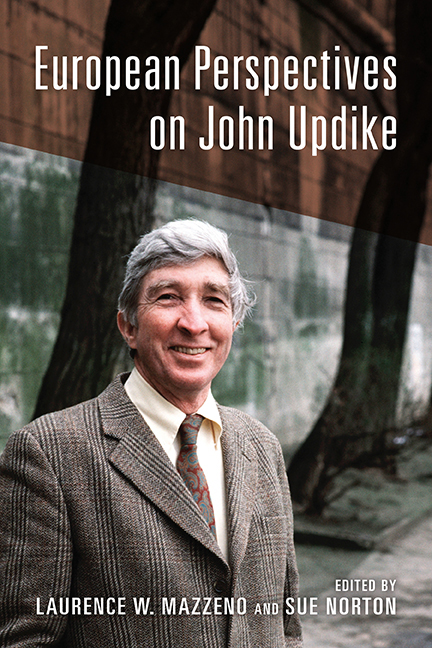Book contents
- Frontmatter
- Contents
- Acknowledgments
- List of Abbreviations
- Introduction: Updike as Europeans See Him
- Part I Coming of Age, Aging in Time
- Part II Love, American Style
- Part III Amazing Grace, American Faith
- Part IV Old World Myths, New World News
- 10 “Hey, Come On, We're All Americans Here”: The Representation of Muslim-American Identity in John Updike's Terrorist
- 11 Intertextual Updike: Gertrude and Claudius
- 12 Rabbit and the News
- Sources for Further Study
- Notes on the Contributors
- Index
11 - Intertextual Updike: Gertrude and Claudius
from Part IV - Old World Myths, New World News
Published online by Cambridge University Press: 15 August 2018
- Frontmatter
- Contents
- Acknowledgments
- List of Abbreviations
- Introduction: Updike as Europeans See Him
- Part I Coming of Age, Aging in Time
- Part II Love, American Style
- Part III Amazing Grace, American Faith
- Part IV Old World Myths, New World News
- 10 “Hey, Come On, We're All Americans Here”: The Representation of Muslim-American Identity in John Updike's Terrorist
- 11 Intertextual Updike: Gertrude and Claudius
- 12 Rabbit and the News
- Sources for Further Study
- Notes on the Contributors
- Index
Summary
GERTRUDE AND CLAUDIUS (2000), Updike's only novel set entirely in Europe, is dedicated to his second wife, Martha, with a passage in Occitan: “De dezir mos cors no fina / Vas selha ren qu'ieu pus am” (“The desire of my heart is endless and only devoted to her, beloved among all others” [Goldin 1973, 102]). In this poem, the troubadour poet Jaufre Rudel (ca. 1150–1200) addresses his lady as his “Amors de terra londana,” his love from a distant land. Rudel offered the most extreme example of the courtly love ideal of “amor de lonh,” a love that depends upon distance, upon not possessing the beloved. According to popular legend, he had fallen in love with the countess of Tripoli purely from reports of her virtues, never having laid eyes on her. He set off for Tripoli, only to become ill en route, and he died in the countess's arms on arrival (Goldin 1973, 100). Within the frame of Updike's novel, only Feng (later Claudius), the adulterous lover of Hamlet's mother and then her second husband, quotes from the troubadours. In the classic exposition of courtly love, love cannot exist in marriage. It depends on obstacles, whether distance, a husband, or—as in Updike's modern updating of the story of Tristan and Isolde in his 1994 novel Brazil—on the barriers of race and class. Feng deliberately absents himself from the Danish court for some thirty years, unable to bear the sight of his beloved's marriage to his brother Horwendil. But he remains devoted to his entirely virtuous lady, Gerutha (Gertrude), until she finally succumbs to his advances at the age of forty-eight.
Critics of Updike have related his interest in courtly love to Denis de Rougemont's influential thesis in Love in the Western World (1963) and its sequel Love Declared (1983). Updike reviewed the latter title and returned to its ideas in several reprises (Begley 2014; Corbellari 1999; Duffy 2016; Grimbert 2004; Schiff 1998). De Rougemont emphasizes the way in which the love relations of men and women depended on a particular historical moment, so that their affective life was conditioned by social circumstances.
- Type
- Chapter
- Information
- European Perspectives on John Updike , pp. 166 - 180Publisher: Boydell & BrewerPrint publication year: 2018

